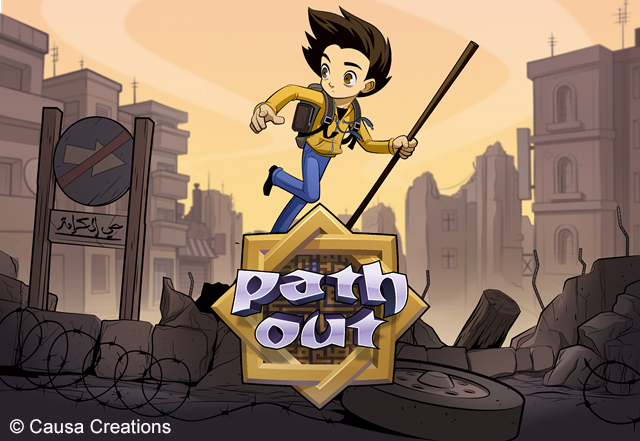“More communication, please!”
Abdullah Karam im Gespräch mit Anita Moser über seine künstlerische Arbeit, das Potenzial von Computerspielen und Salzburg als Ort kultureller Teilhabe und Produktion
Der Künstler, Illustrator, Influencer und leidenschaftliche Gamer Abdullah Karam lebt und arbeitet in Salzburg, wo er nach seiner Flucht aus Syrien über die Türkei im Herbst 2015 ankam. In seinem gemeinsam mit Georg Hobmeier von dem Künstler_innenkollektiv gold extra gestalteten und vielfach ausgezeichneten Computerspiel Path Out erzählt Karam die Geschichte seiner „Reise*1 *(1) Das besondere Potenzial von Videogames sieht er unter anderem darin, dass sie Situationen unmittelbar erlebbar machen und dadurch die Perspektiven Spielender verändern können, wie er im folgenden auf Englisch und Deutsch geführten Gespräch betont.
Was verstehst du unter „Kunst und Kultur für alle“ hier in Salzburg oder generell?
Generell ist jeder auf seine Art Künstler. Es gibt keine Gesetze, die uns erlauben oder verbieten künstlerisch zu arbeiten. Kunst ist für mich, dass man seine Meinung ausdrücken kann und zwar mit unterschiedlichen Methoden. In Salzburg geht das gut, da die Menschen open-minded, aufgeschlossen sind. Kultur ist ein Teil unserer Welt. Man kann nicht sagen, diese Kultur ist „gut“ und jene „schlecht“. Man muss die eigene Kultur auch nicht zu ernst nehmen, denn es gibt viele andere Kulturen – und diesbezüglich sollte man die eigene Perspektive ändern. Ich habe immer zwei Perspektiven: Die österreichische Kultur hat viel Gutes, aber auch Dinge, die ich nicht gut finde. Ebenso ist es mit der syrischen Kultur – und ich wähle aus, was zu mir passt. Ich habe sozusagen eine Mischung: best of both worlds.
Haben alle Menschen die Möglichkeit, sich künstlerisch zu betätigen oder siehst du Einschränkungen?
Sicher gibt es Einschränkungen. Aber ich glaube, es kommt auch auf die innere Einstellung an. Manchmal denkt man, dass man etwas aufgrund seiner Kultur oder Religion nicht darf, und verbirgt das, was man eigentlich sagen möchte. Wenn ich etwas – aus Angst, wie die Leute über mich denken, oder weil es nicht Teil meiner Kultur ist – nicht tue, beschränke ich mich selbst.
Einschränkungen gibt es aber auch von außen, zum Beispiel von den Institutionen. Do you think just anyone can visit a museum or are there limits that we don’t realize or we don’t see?
I think there are walls in the mind, even if we are unaware of them. And I think it is a question of education, different cultures and different traditions. I don’t want to talk about my culture, but I know how it is when you are born in a country where you don’t get in contact with a lot of museums. So this sets limits that people maybe don’t notice. Someone might say, “Oh, museums are amazing and they are fun” because it’s the way he or she was raised. People who were raised differently might find museums boring.
And if you talk about cultural production?
“Production” – I like it. I like it because culture doesn’t stop, culture keeps on evolving.
For some people, it’s easier to get access to express themselves in different cultural ways, to create their art and their life somehow, and for other people it’s more difficult.
Yes, I was one of them.
In which way?
I could not express myself and my experiences with art. I was raised in a family where we were not so amenable to modern art or something like this. I think the more open-minded the society is, the more possibilities there are. And the more closed-minded the society is, the fewer possibilities you have. Because if the society is all about being traditional, and everything should stay the same, it would be really hard to express oneself through new possibilities or different methods.
So what I practice now with art is everything – everything that I could think of. There are a lot of things that I don’t enjoy but I don’t limit myself to one issue and I don’t like to be limited by others to one issue. I always wanted to try acting. I have a silly reason in my life for it: As I got really close to death I said if I survive that, I want to try everything. If this is not the end, I want to try and do everything I always wanted to do. So with that moment, my whole life changed, basically. I started living my life as if every day was the last day. And that’s how I communicate with people. So when I go to a big event, I ask people for cooperation, and when they try to avoid or delay it to the next year, I say: “I don’t know if I’ll be alive tomorrow. So if you really feel like doing this, let’s do it now, let’s be united now, let’s exchange ideas now.”
Anita Moser, Abdullah Karam ( 2018): “More communication, please!”. Abdullah Karam im Gespräch mit Anita Moser über seine künstlerische Arbeit, das Potenzial von Computerspielen und Salzburg als Ort kultureller Teilhabe und Produktion . In: p/art/icipate – Kultur aktiv gestalten # 09 , https://www.p-art-icipate.net/more-communication-please/


 Artikel drucken
Artikel drucken Literaturverzeichnis
Literaturverzeichnis